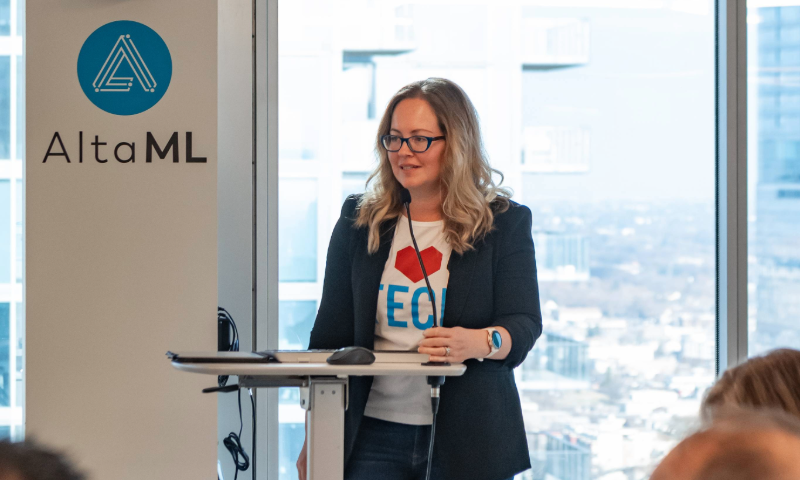Nicole Janssen is a highly accomplished entrepreneur and leader in the field of artificial intelligence. As Co-Founder and Co-CEO of AltaML, a leading developer of AI-powered solutions, she has driven the company’s success in diverse sectors such as agriculture, health, and energy. Nicole is dedicated to responsible AI and has been recognized by the RAI Institute as a thought leader in its implementation. She has received numerous accolades, including being named one of North America’s Top 25 Women of Influence, and Woman in AI of the Year. Nicole is the Director at Edmonton Unlimited, the Canadian Council of Innovators, and serves as a member of the Future of AI Council.
Recently, in an exclusive interview with Digital First Magazine, Nicole shared her professional trajectory, what sets AltaML apart from other market competitors, insights on the three things aspirants need to create a highly successful career in the tech industry, her role model, significant career milestones, pearls of wisdom, and much more. The following excerpts are taken from the interview.
Nicole, can you share with us the ‘backstory’ of how you decided to pursue a career path in tech?
I consider myself a lifelong entrepreneur, both my parents spent part of their career as entrepreneurs and my brief stint as an employee demonstrated to me that I am simply a terrible employee. While my journey didn’t start in tech, having the right mindset to take risks is critical in finding success. Making the move into tech 12 years ago was not an active decision, but it was the right one. My tech journey began in our digital media company, Janalta Interactive Inc., but in 2017 we could see that AI would soon disrupt that industry. It was from exploring our own opportunities with AI that we recognized the potential for AltaML to drive tangible impact in the AI space. While it’s taken time for us to get to where we are today, through starting small with a group of 10 to now over 100 team members, we’ve really established ourselves as leaders in the market, who lead with ethical practices. In my mind, we’re exactly where we need to be.
Brief us about the mission and vision of AltaML. What sets it apart from other market competitors?
From day one, our mission has been to elevate human potential with applied AI and that vision really hasn’t changed. Our goal is to be committed to creating tools that leverage a proven methodology for applied AI, enabling the transformation of data into actionable insights. This is achieved through strategic partnerships, investment, and access to talented, versatile teams.
Leading with education, like AI literacy, sets us apart from the competitors because we really put in the time to co-develop solutions that will solve a business problem and encourage adoption. Navigating change management can often present significant obstacles for organizations looking to embrace AI. One of our greatest differentiators is that we offer comprehensive support, not only throughout the deployment phase but also beyond, ensuring that teams, including those external to our own organization, receive assistance at every stage of the process.

How can a company identify realistic use cases that really benefit them? Is AI useful for every company at all? What typical mistakes do companies make when implementing AI?
AI has potential for every company, but there’s a lot to consider. Starting an AI project without a clear business problem can be a major roadblock and one of the most common mistakes we see. Too often we see organizations trying to do something “cool” with AI or they go after the latest AI tools, but they aren’t actually solving an existing business problem with these projects. The use case needs to tie into the strategic plan and help to solve an existing business problem or it won’t get the attention it needs to bring it to full operation. My best advice for anyone thinking about AI is to start small. Get some wins under your belt and build support within your organization. We all dream big, but sometimes it’s the smaller, practical use cases that really get us moving in the right direction, especially at the beginning. We often highlight that 70% of our use cases, once they’ve advanced beyond the feasibility stage, are progressing toward full operationalization. One of the key factors contributing to this high success rate is because we’re committed to guiding you every step of the way, continuously iterating and refining to achieve the best possible outcome.
As with any career path, the tech industry comes with its own set of challenges. Could you elaborate on some of the significant challenges you faced in your tech career and how you managed to overcome them?
Public perception of AI is one of the biggest challenges we face as a company and as an industry. The fear around AI perpetuated by media, misinformation, and some strong voices hinders the advancements of the technology. The main driver for us to overcome that stigma has been to lead with responsible AI. To enforce success has come with a clear strategy of encouraging education for those that we work with. This starts from the bottom all the way to the top. A clear understanding of AI and its impact on our everyday lives will empower individuals and organizations to embrace its potential for positive transformation, dispelling unfounded fears and fostering a more informed and inclusive approach to AI integration.
Can you please share the “Three Things You Need To Create A Highly Successful Career In The Tech Industry”?
- Tech is always changing, and you need to be prepared to adapt your approach, skills, and offerings constantly.
- Don’t count yourself out. Having a tech career does not require you to start as a data scientist or a software developer. There are many paths to being a leader in the tech industry and just because your background doesn’t scream tech, doesn’t mean you won’t be great at it.
- Do not operate in a silo. The more you know about the business problems faced by other businesses/departments, and so on, the better you can be at helping to create an effective solution to the problem.
As you know, there are not that many women in the AI industry. Can you advise what is needed to engage more women in the AI industry?
It all starts early on. Choosing to become a data scientist later in life is tough, yet doable. But if we encourage girls to explore STEM fields, those who naturally lean toward it might pursue it more confidently, breaking down the idea that some careers are only for men or women. The more opportunities young girls have to see women in AI, the more likely they are to see themselves there. I see that change happening, which is hopeful, but we’ve got to start young to really make a difference. We can’t overhaul everything overnight, but we can reshape the story. Supporting women to thrive is a responsibility we all share. The path to the top for women is often tougher, but we can definitely make it and excel. Having a voice at decision-making tables is crucial. We need to influence big choices and shape what lies ahead for the next generation.

What are some of the industries that AI will most impact over the next decade?
Simply put, all traditional industries will see and feel the impacts of AI. While AI’s impact will be widespread across all sectors, among these, some will be more impactful than others in their roll out of AI. Health care and energy stand out as particularly primed for impactful transformation. We’re already witnessing AI in action, from resource management to climate monitoring, and the potential for further innovation is limitless.
Who is your modern-day hero and why?
My grandma. She passed away several years ago but there were some traits she had that I don’t see in a lot of people. She was always truly interested in the person she was talking to and spent her time asking about them, not talking about herself. She made sure her home was a place where everyone felt welcome. She learned new things until she died, getting her first computer at the age of 90 and proceeding to write her biography on it. She was always honest, even when it stung a little.
What do you feel has been your ‘career-defining’ moment?
When I first became the Co-CEO of AltaML, I looked to the market to see what a tech CEO should act like. I compiled a list of qualities I had read about these successful CEOs and tried to emulate them. Unfortunately, there weren’t any tech CEOs that operated in a way that felt natural to me in my leadership style. I stumbled for a while trying desperately to conform to what I thought was expected of me. My biggest career-defining moment was when I came to the realization that I needed to lean into my strengths as a leader to be successful and continue to perfect those skills over time.
Where do you see yourself in the next 5 years?
I had the opportunity to meet Richard Branson, and he told me that one of the secrets to his success was saying yes to opportunities and figuring out how to make them happen later. So, five years from now, I will still be saying yes, but where that will lead me is impossible to predict.
What advice do you have for those looking to grow their careers in AI/ML?
To grow your career in AI/ML, it’s crucial to remain humble throughout your successes and embrace failure as part of the journey. Being agile in this industry is essential for career growth and avoiding stagnation. Stay curious and remember that as long as you’re actively seeking opportunities, you’re bound to achieve some level of success along the way.






